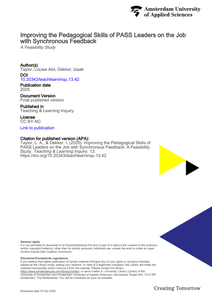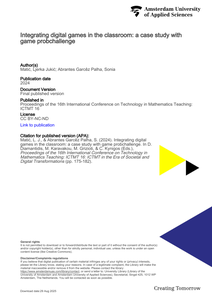The impact of organized youth sport on youth development depends on various conditions in the pedagogical climate, such as how sport is delivered by youth sport coaches. While this is broadly acknowledged and provides a basis to improve youth sport and its developmental outcomes, little is known about the pedagogical perspectives of youth coaches on their practice. This study uses semi-structured interviews with 32 youth sport coaches in diverse youth sport contexts in the Netherlands. Reflexive data analysis is employed to garner insights into coaches’ role perceptions, coaching goals, and underlying values. The findings show that while youth coaches focus on sport-centered activities, many foreground non-sport dimensions such as life mentoring and working towards social inclusion as critical elements of their work, reflected in five pedagogically-oriented goals: discipline, autonomy, resilience, social abilities, and aspirations. Underlying these goals are pedagogical values such as building and maintaining caring relationships with participants. These goals and values echo scientific literature on pedagogical sport climate conditions (e.g. positive youth development), and challenge notions of youth sport as a performance-oriented and uncaring setting. The results contribute to existing knowledge about youth coaches’ pedagogical orientations, and inform the development of strategies to stimulate positive sport practices and developmental outcomes for participants.
DOCUMENT

PCK is seen as the transformation of content knowledge and pedagogical knowledge into a different type of knowledge that is used to develop and carry out teaching strategies. To gain more insight into the extent to which PCK is content specific, the PCK about more topics or concepts should be compared. However, researchers have rarely compared teachers’ concrete PCK about more than one topic. To examine the content dependency of PCK, we captured the PCK of sixteen experienced Dutch history teachers about two historical contexts (i.e. topics) using interviews and Content Representation questionnaires. Analysis reveals that all history teachers’ PCK about the two contexts overlaps, although the degree of overlap differs. Teachers with relatively more overlap are driven by their overarching subject related goals and less by the historical context they teach. We discuss the significance of these outcomes for the role of teaching orientation as a part of PCK.
DOCUMENT

Although Pedagogical Content Knowledge (PCK) is traditionally defined as a static quality that teachers possess and apply in practice, we conceive of PCK as constituted by a dynamic, mutually influencing process between teacher and students. This co-constructing process is expressed in real-time interaction and defined by us as Expressed Pedagogical Content Knowledge (EPCK). The aim of this study is to develop a practically usable instrument that can track the microgenetic moment-to-moment interaction that embodies EPCK, and that enables us to observe different features and levels of EPCK in the form of changes in this interaction dynamics. We were interested to know how EPCK emerges and develops on the short-term time scale of classroom interaction. After presenting a general account of complex dynamic systems based measurement of psychological constructs (e.g., PCK), we describe a coding scheme for teacher-student interactions, based on theoretical EPCK components. The instrument was applied in an empirical observation study of a visit to a mobile planetarium by a grade 3 primary school class. A principal factor analysis was used to find latent EPCK components. Results show, firstly, that the instrument was reliable. Secondly, the variables in the coding scheme were relevant in view of the underlying theory. Thirdly, over the time course of the teaching session, latent components displayed various levels of EPCK – high, low or no ECPK. Instead of being an enduring or stable property of teaching-learning interactions, EPCK is a dynamic property occurring in the form of sequences of high and low levels, and corresponding peaks in the latent factors. Notably, EPCK did not appear in the form of a continuous steady state level but occurred in the form of bursts of high-level EPCK. We conclude that our coding scheme provides an adequate method for studying pedagogical content knowledge as it self-organizes in the form of real-time activity in the classroom.
LINK
Online supplements to Smit, E., Tuithof, H., Savelsbergh, E., & Béneker, T. (2023). Geography teachers’ pedagogical content knowledge: A systematic review. Journal of Geography. https://doi.org/10.1080/00221341.2023.2173796 Supplement 1: Extended information on selected studies Supplement 2: Full references of studies used in the review Supplement 3: Codebook Abstract: Pedagogical Content Knowledge (PCK) is the knowledge teachers use to teach a specific subject to a specific audience. The importance of PCK to quality teaching is widely recognized. However, an overview of research about geography teachers’ PCK is missing. To fill this gap, we conducted a systematic review. We analyzed 43 empirical studies, but only 9 used PCK as a framework. Most studies addressed instructional strategies or teaching orientations. The studies were too diverse to draw conclusions on geography teachers’ PCK in general. But portraits of 16 geography teachers emphasized the necessity of geographical knowledge and teaching experience for PCK-quality.
MULTIFILE

Peer assisted study sessions (PASS), also known as Supplemental instruction, are structured peer guided sessions linked to a specific course, led by experienced and trained students called PASS-leaders. These PASS-leaders undergo several days of training before running their first session and receive supervision and feedback ‘on the job’. Research suggests that training improves student outcomes whereby supervision is considered best practice, as required by PASS protocols. However, it is unclear what type of supervision best supports PASS-leaders. Thus far, studies have not compared different methods for on-the-job interventions. Current practice involves supervisors observing PASS sessions without intervening but providing post hoc feedback. While this prevents undermining the PASS leaders, it delays their ability to act on feedback immediately. This study, carried out at an institution for initial teacher education, developed and tested a method for providing immediate feedback using a bug-in-ear device linked to a live-stream. Six PASS-leaders were observed during 4-6 sessions each, receiving either synchronous feedback with a bug-in-ear or in-person asynchronous post hoc feedback. In group interviews PASS-leaders reported appreciating the immediacy of synchronous feedback which allowed them to act on it in real-time. The surveys after each lesson indicated that they felt significantly more confident about teaching following live feedback. They described the supervisor as an invisible helper, providing support or assistance. Because the bug-in-ear method could only provide feedback on visible instructional and pedagogical actions, both PASS-leaders and PASS-supervisors recommended using this as a supplement to a pre-session briefing and a post-session debrief.
DOCUMENT

Teaching history requires clear, detailed and subject specific language. History teachers teaching in a second language are confronted with students' second language limitations, which likely have an aggravating impact on their application of pedagogical content knowledge (PCK). We analysed and compared 12 Dutch spoken and 12 English spoken paired history lessons in junior grades 7 and 9. Contrary to our expectation, we found a strong similarity of the teachers’ PCK application in both grades 7 and 9, irrespective of the used language. The PCK application in both grades and languages was of average quality, while the PCK used in grade 9 was more advanced.
DOCUMENT

This paper reports how a mathematics teacher uses a digital game for learning and teaching in the classroom. We utilize a case study approach to examine the pedagogical activities present in the lesson. The results of the study indicate that not all of the lesson objectives were met. Even though the teacher planned the lesson and the activities for the students, his lack of knowledge about gamebased pedagogy had an impact on the learning outcomes.
DOCUMENT

In this study, we aimed to identify how the learning activities elicited in a lesson study project contributed to self-perceived change in supervisors’ pedagogical content knowledge (PCK). Lesson study is a method which combines both professional and educational development. During a lesson study project, teachers collaborate in a team and develop, teach, evaluate, and redesign a research lesson. During the 4-month lesson study project described here, four supervisors designed a protocol for research supervision meetings aimed at enhancing undergraduate students’ learning. During the project, they experimented with open questioning and giving positive feedback instead of giving instruction and explanations. A mixed-methods design was used in this study. Data on the supervisors’ learning activities and PCK were gathered using learner reports, video-recordings of meetings, and exit interviews. The analyses of these data showed that the lesson study project contributed to the development of the supervisors’ PCK on instructional strategies and student understanding. The learning activity that contributed most to these changes was reflecting on their own practice and that of their students.
MULTIFILE

De lerarenopleiding speelt een belangrijke rol bij de voorbereiding van leraren in opleiding op het gebruik van technologie voor onderwijzen en leren. Uit de literatuur blijkt echter dat lerarenopleiders vaak moeite hebben om een doeltreffende ICT-integratie te modelleren. De bereidheid om ICT in het onderwijs te gebruiken heeft betrekking op het verwerven van kennis, vaardigheden en attitudes over het gebruik van technologie voor onderwijzen en leren. Wanneer deze bereidheid tot uiting komt in het feitelijke gebruik van technologie in de klas, en het vermogen om op dit gebruik te reflecteren, past dit in de conceptualisering van 'didactische ICT-competentie'. Een curriculumherziening op vijf locaties van de Lerarenopleiding Basisonderwijs (Pabo) van Hogeschool Inholland in Nederland vormde de aanleiding voor deze studie. Het doel van dit onderzoek is het meten van de perceptie van leraren in opleiding van de strategieën die lerarenopleiders gebruiken om de ontwikkeling van effectief gebruik van informatie- en communicatietechnologie (ICT) in de klas te ondersteunen. Het Synthesis of Qualitative Data (SQD) model definieert zes kernstrategieën voor de ondersteuning van leerkrachten in opleiding om ICT in het onderwijs te gebruiken, namelijk (1) rolmodellering; (2) reflectie over de rol van technologie;(3) leren van technologie door (her)ontwerpen van lessen; (4) samenwerken met collega's; (5) authentieke Teaching, Learning & Technology en (6) voortdurende feedback. De centrale vraag van dit onderzoek luidt: Hoe percipiëren leraren in opleiding van vijf lerarenopleidingen deze strategieën die lerarenopleiders gebruiken om de ontwikkeling van hun didactische ICT-competenties te ondersteunen? Er werd gebruik gemaakt van een mixed-methods onderzoeksopzet. De SQD-vragenlijst met 24 items (zespunts Likert-schaal) werd vertaald naar het Nederlands en uitgebreid met zes open vragen, die verdere uitwijding bij elk van de kernstrategieën mogelijk maakten. Vijf locaties van de Lerarenopleiding Basisonderwijs (Pabo) van Hogeschool Inholland in Nederland waren erbij betrokken. De strategieën "authentieke technologie-ervaring" en "rolmodellering door de lerarenopleider" worden het meest herkend. Het geven van voortdurende feedback was de minst erkende strategie omdat feedback vooral als summatief werd ervaren. De meerderheid van de lerarenopleiders werd niet herkend als rolmodel voor ICT-integratie. Lerarenopleiders in digitale geletterdheid echter wel. Hoewel de stages een ruimte bieden om te oefenen, worden de zittende leerkrachten niet erkend als inspirerende voorbeelden van ICT-integratie. Als leerkrachten in opleiding te weinig rolmodellen zien die vakspecifieke ICT-integratie tonen, ontwikkelen zij zelf geen doeltreffende ICT-integratie. Verder onderzoek zou zich moeten richten op de vraag hoe het aantal erkende strategieën kan verhoogd worden, te beginnen met het "geven van continue feedback".
DOCUMENT

Some pre-service teaching activities can contribute much to the learning of pedagogical content knowledge (PCK) and subsequent teaching as these activities are generating PCK within the pre-service teacher's own classroom. Three examples are described: preparing exhibitions of science experiments, assessing preconceptions, and teaching using embedded formative assessment in which assessment leads teaching and almost inevitably results in the development of PCK. Evidence for the effectiveness of the methods is based on the author's experience in teacher education programmes in different countries, but will need to be confirmed by research
DOCUMENT